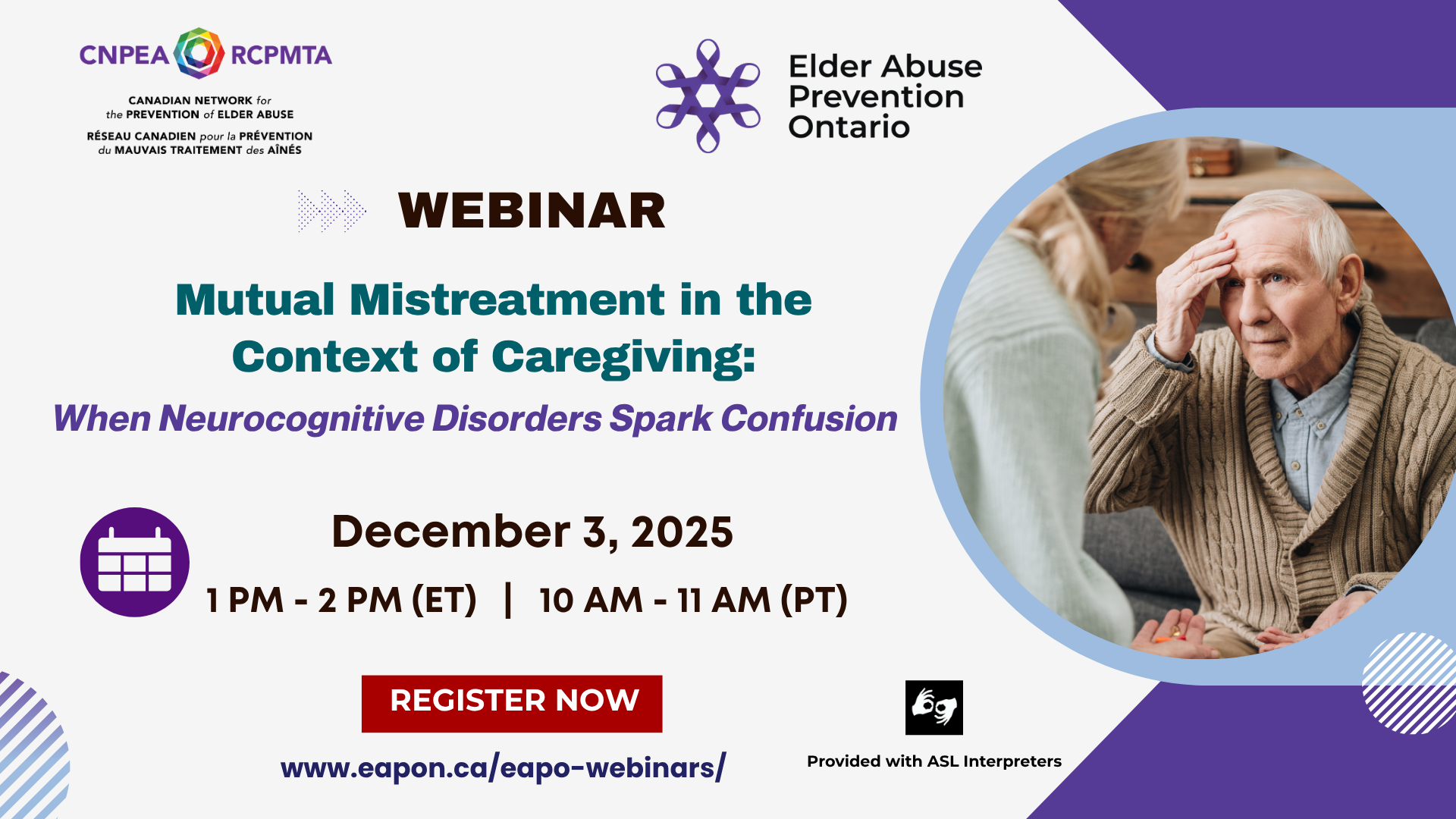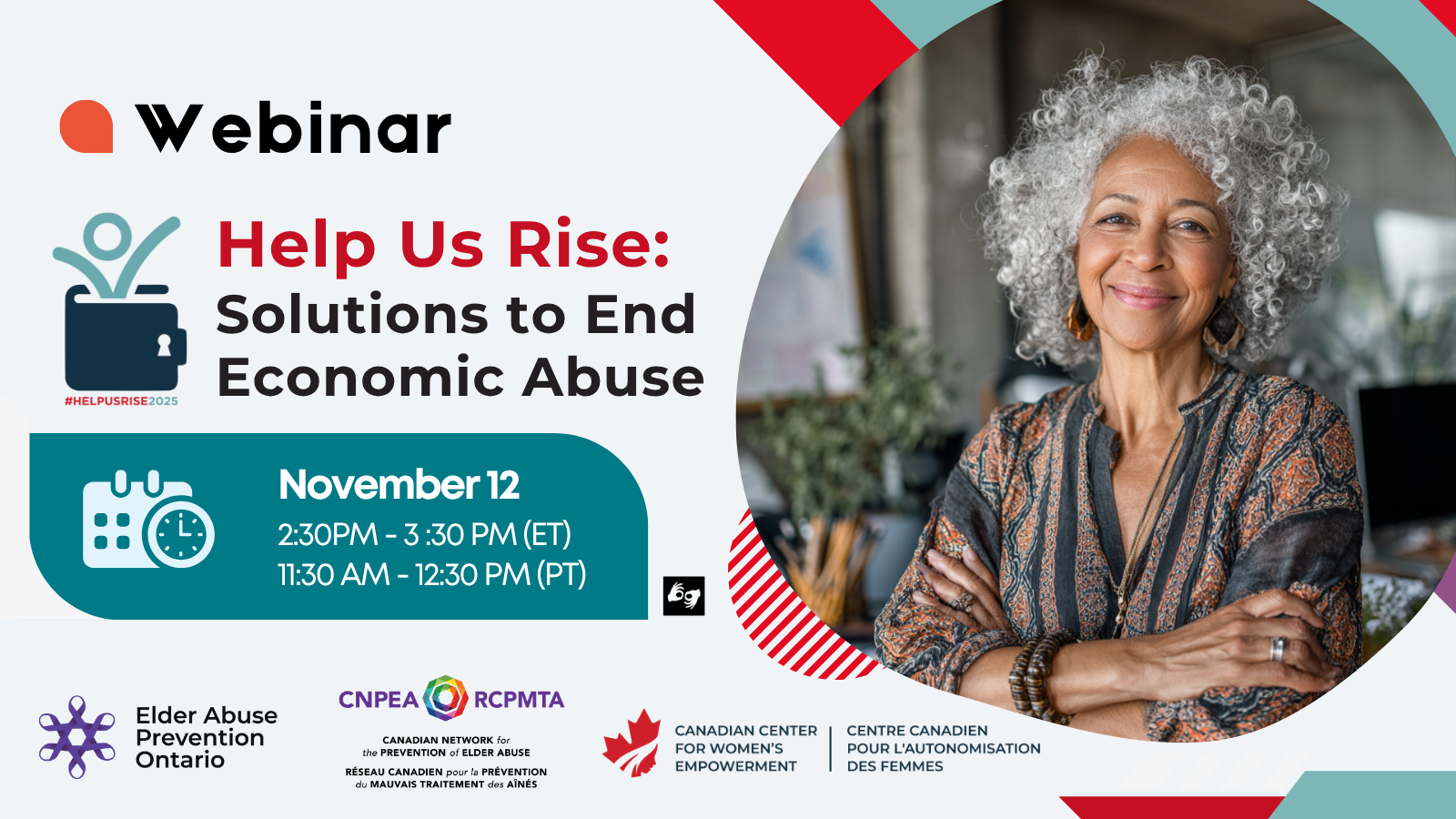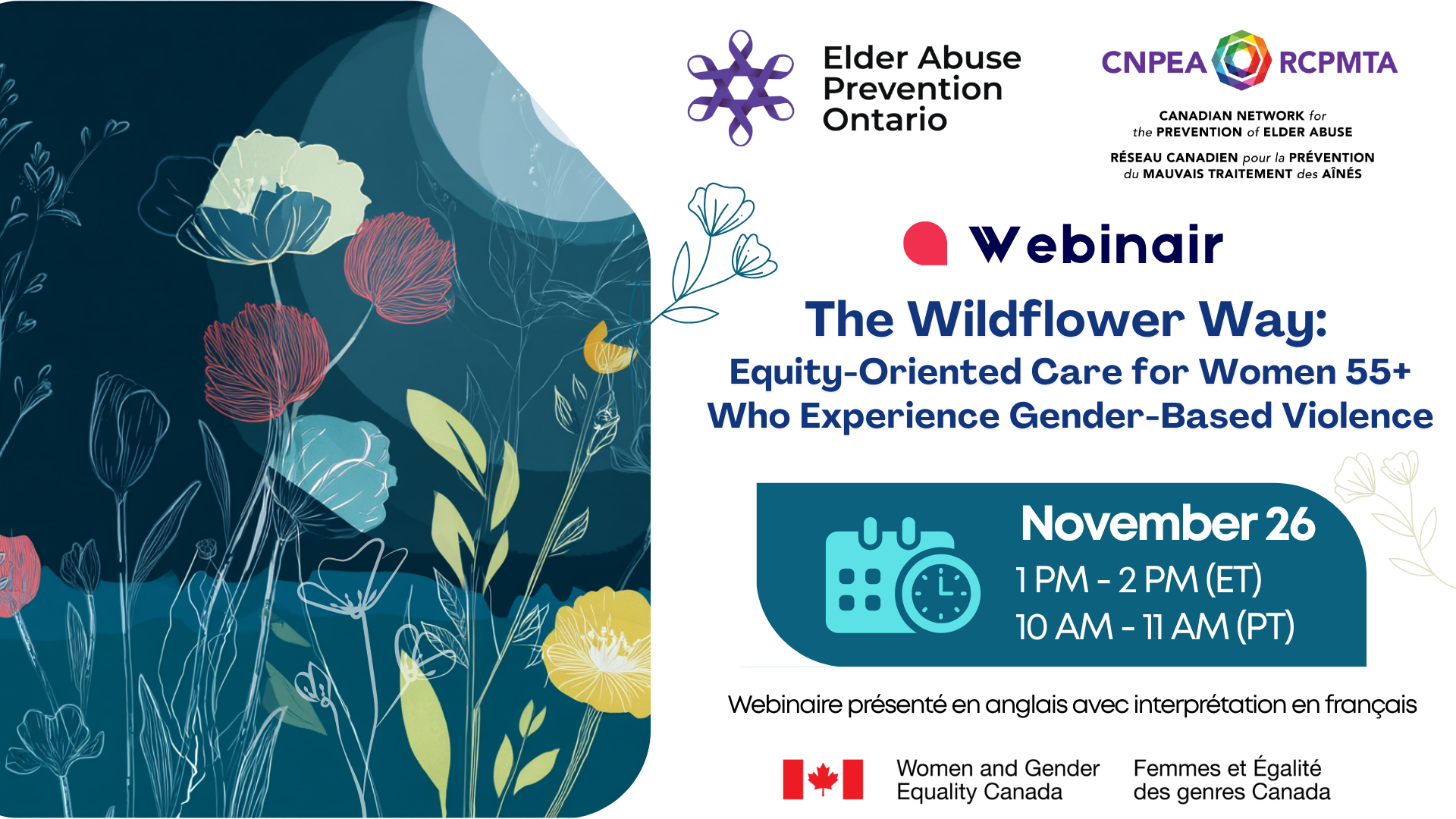
Join our upcoming CYBER SAFETY WORKSHOP SERIES, organized in partnership between CNPEA, Elder Abuse Prevention Ontario and Connected Canadians for Fraud Prevention Month.
- The following sessions will be held in English as well a in French (separate events).
- ASL Interpretation will be available.
- These webinars will not be recorded.
Register for the session(s) of your choice below.
Workshops in English:
Wednesday, February 18 at 10 AM Pacific / 1 PM Eastern
Cyber Safety: Understanding the Digital Landscape
Explore the digital landscape, learn to recognize common online risks, and gain practical strategies to protect personal information.
Register here
Wednesday, March 11 at 10 AM Pacific / 1 PM Eastern
Social Engineering Awareness
Learn how scammers use impersonation, manipulation, and urgent requests to trick people online, with practical tips to recognize and respond safely.
Register here
Wednesday, March 18 at 10 AM Pacific / 1 PM Eastern
What to Do if Something Goes Wrong
Learn how to recognize warning signs of a cyber incident and practice simple response strategies to feel prepared and confident if problems arise.
Register here
Wednesday, March 25 at 10 AM Pacific / 1 PM Eastern
Supporting People After Cyber Incidents & Strengthening Communities
Learn how to support peers who have experienced scams or cyber incidents by offering reassurance, sharing trusted resources, and fostering community resilience.
Register here
Tuesday, March 31 at 10 AM Pacific / 1 PM Eastern
Financial Scam Prevention & Identity Theft Protection
Build knowledge and confidence to protect themselves from common online scams and fraud.
Register here
Wednesday, April 8 at 10 AM Pacific / 1 PM Eastern
Digital Safety Tools: Building Your Personal Cyber Security Toolkit
Learn how to protect their devices and online accounts using simple, effective digital safety tools.
Register here
Ateliers en français
Le 18 février à Midi heure de l'Ouest / 15 h de l'Est
Comprendre le paysage numérique
Explorez l’environnement numérique, apprenez à reconnaître les risques courants en ligne et découvrez des stratégies pratiques pour protéger vos renseignements personnels.
Inscription
Le 11 mars à Midi heure de l'Ouest / 15 h de l'Est
Sensibilisation au piratage psychologique
Découvrez comment les fraudeurs utilisent l’usurpation d’identité, la manipulation et des demandes urgentes pour piéger les gens en ligne, ainsi que des conseils pratiques pour reconnaître ces stratagèmes et réagir de façon sécuritaire.
Inscription
18 mars à Midi heure de l'Ouest / 15 h de l'Est
Que faire si quelque chose tourne mal ?
Apprenez à reconnaître les signes avant-coureurs d’un incident de cybersécurité et à pratiquer des stratégies simples pour réagir, afin de vous sentir prêt(e) et en confiance si un problème survient.
Inscription
25 mars à Midi heure de l'Ouest / 15 h de l'Est
Soutenir les personnes après des incidents cybernétiques et renforcer les communautés
Apprenez à soutenir des pairs ayant vécu des fraudes ou des incidents de cybersécurité en offrant du réconfort, en partageant des ressources fiables et en favorisant la résilience communautaire.
Inscription
31 mars à Midi heure de l'Ouest / 15 h de l'Est
Prévention des arnaques financières et protection contre le vol d'identité
Développez vos connaissances et votre confiance pour vous protéger contre les fraudes et escroqueries courantes en ligne.
Inscription
8 avril à Midi heure de l'Ouest / 15 h de l'Est
Outils de sécurité numérique : créer votre boîte à outils personnelle pour la cybersécurité
Apprenez à protéger vos appareils et vos comptes en ligne à l’aide d’outils de sécurité numérique simples et efficaces.
Inscription
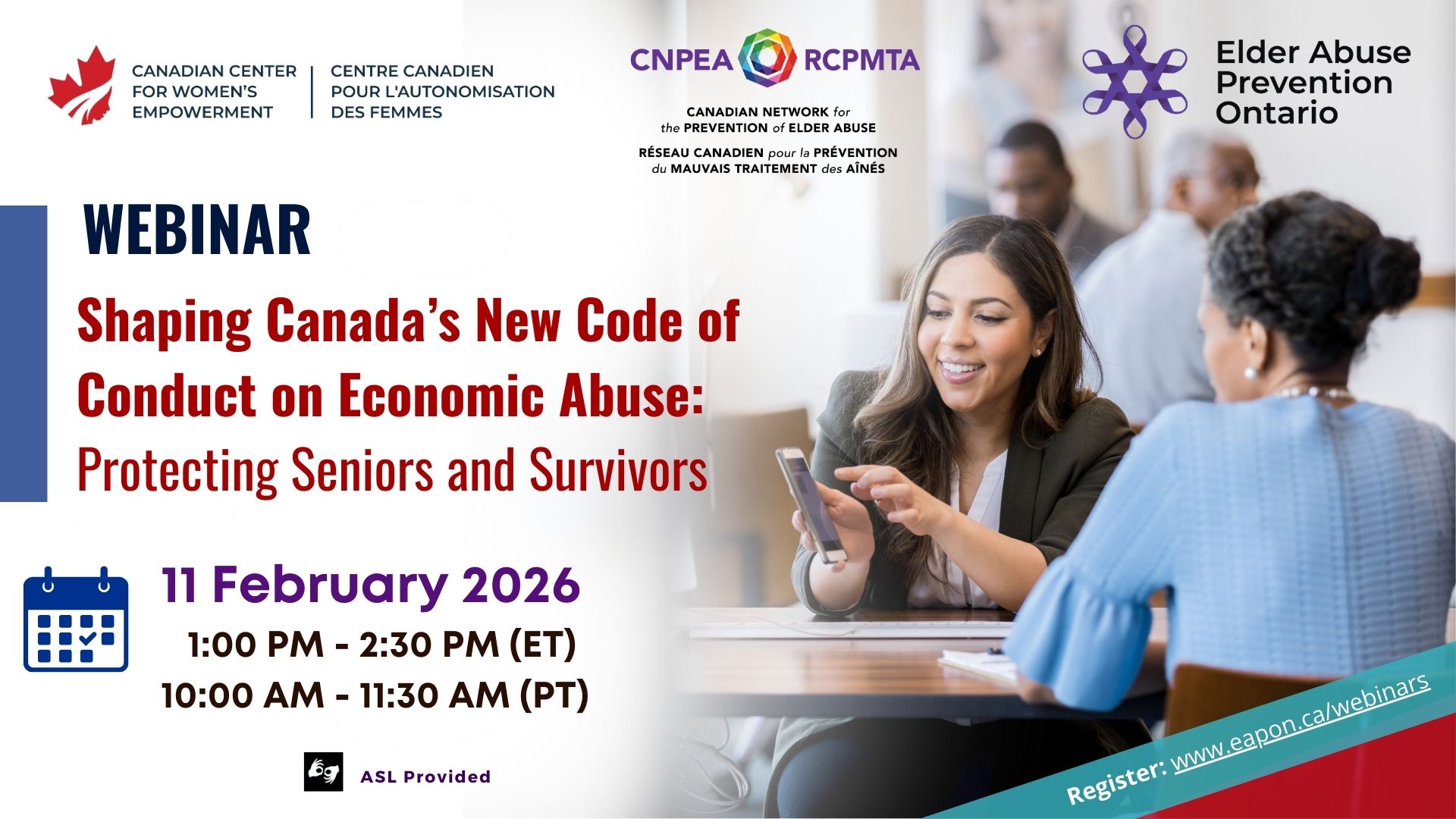
WHEN
February 11, 2026
10 AM to 11:30 AM Pacific Time / 1:00 – 2:30 PM Eastern Time
REGISTER NOW
ABOUT
CNPEA, along with partners Elder Abuse Prevention Ontario and the Canadian Centre for Women Empowerment, are planning to host a virtual panel on February 11 entitled “Shaping Canada’s New Code of Conduct on Economic Abuse: Protecting Seniors and Survivors”
This panel will feature a variety of speakers. Representatives from financial institutions, from the Ombudsman for Banking Services and Investments (OBSI), as well as survivors with lived expertise of economic violence. Together, we will explore the newly announced Code of Conduct on the Prevention of Economic Abuse and its implications for survivors, as well as how it will shape the way financial institutions recognize and respond to economic abuse. We will also assess the impact of the seniors’ code, highlight best practices, and identify lessons that can guide the development of the new Code of Conduct on the Prevention of Economic Abuse.
This session aims to provide participants with :
- A clear sense of the current Code of Conduct for the Delivery of Banking Services to Seniors and its impact in real life.
- A better understanding of economic abuse, including what survivors experience and how banks can enhance support.
- A look at what the new economic abuse code of conduct could change for survivors and for the way financial institutions work going forward.
PRESENTERS

Watch the recording
Download the slides
Additional Resources:
- Research Chair on Mistreatment of Older Adults
https://maltraitancedesaines.com/en/team/ - Grey Targets – Official podcast of the Research Chair on Mistreatment of Older Adults: https://maltraitancedesaines.com/en/podcasts/
- Mistreatment of Older Persons: Federal Policy Definition - Explanatory Document - Canada.ca
- Elder abuse prevalence and risk factors: findings from the Canadian Longitudinal Study on Aging
- https://alzheimer.ca/en
- Alzheimer society online hug: This online learning space provides helpful resources and information for health-care providers, people expecting a diagnosis of dementia, people living with dementia, and care partners related to dementia. https://alzheimer.ca/en/help-information/online-learning
- Quebec: Mistreatment Helpline:1-888-489-2287, lignemaltraitance.ca
- Ontario Caregiver Organization: https://ontariocaregiver.ca/
- Behavioural Supports Ontario (BSO) This site will provide you and your loved ones with information about behaviour change in older adults and the Behavioural Supports Ontario program initiative: www.behaviouralsupportsontario.ca/
WHEN
Wednesday, December 3, 2025
10 AM Pacific / 1 PM Eastern
ASL Interpretation available
ABOUT
This webinar presented by the Research Chair on Mistreatment of Older Adults will address the confusion created by neurocognitive disorders when it comes to understanding mistreatment in the context of caregiving.
Based on recent scientific data, this presentation aims to demystify the particularities of mistreatment in this context, including factors complicating relationships, such as how illness is understood, the presence of mental health problems and the use of inappropriate strategies. Mistreatment can not only affect the older adult, but also the informal caregiver. Good intentions are not always enough to make sure everyone is safe.
Hosted by : The Canadian Network for the Prevention of Elder Abuse and Elder Abuse Prevention Ontario
PRESENTER
 Mélanie Couture, PhD, Chairholder of the Research Chair on Mistreatment of Older adults,
Associate Professor, School of Social Work, Université de Sherbrooke
Mélanie Couture, PhD, Chairholder of the Research Chair on Mistreatment of Older adults,
Associate Professor, School of Social Work, Université de Sherbrooke
Mélanie Couture, PhD, is the current chairholder of the Research Chair on Older Adult Mistreatment and associate professor at the School of Social Work – Université de Sherbrooke. She has worked as a researcher in social gerontology for more than a decade. Her research promotes the co-construction and integration of clinical and organizational innovations for the prevention and management of mistreatment situations in the context of caregiving, common living environments and in the use of technologies for aging in place.
Watch the recording
Download the slides
Additional resources:
Reclaiming Power and Place:The Final Report of the National Inquiry into Missing and Murdered Indigenous Women and Girls
Equip Health Care: https://equiphealthcare.ca
Trauma and violence-informed approaches to policy and practice (Gov. of Canada)
- Trauma and violence-informed approaches to policy and practice - Canada.ca
- EN: www.canada.ca/en/public-health/services/publications/health-risks-safety/trauma-violence-informed-approaches-policy-practice.html
- FR: www.canada.ca/fr/sante-publique/services/publications/securite-et-risque-pour-sante/approches-traumatismes-violence-politiques-pratiques.html
Safe Havens - Emergency Shelter Solutions for Older People in Canada (CNPEA)
Webinar and infographics
Sheltering Programs for Older Adults in Canada Infographic
When
November 26, 2025
10 AM Pacific / 1 PM Eastern
Summary
The status quo in services for older women who are victim-survivors of gender-based violence is unacceptable. The Wildflower Way, a new resource from CNPEA developed with the support of WAGE Canada, aims to support professionals in human services with tools to integrate services for older women who have experienced gender-based violence (GBV) into broader equity efforts through relational, trauma -and violence- informed policy and practice.
The Wildflower Way is both a narrative strategy and a practical guide for nurturing growth, offering a path toward sustainability, healing, and genuine systemic change in human services. This webinar will introduce the guide and tools and how you can adopt them to help transform your practice.
Presenters
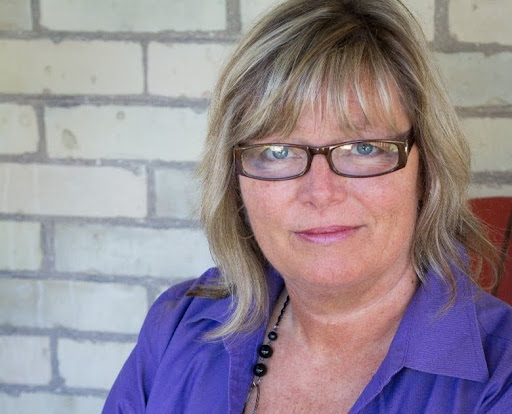 Margaret MacPherson, Wildflower Project Manager
Margaret MacPherson, Wildflower Project Manager
Margaret is a Research Associate with the Centre for Research and Education on Violence against Women and Children (CREVAWC) at Western University in London Ontario. Margaret designs and develops curriculum and related materials on a number of initiatives including the Make It Our Business, workplace domestic violence program and It’s Not Right! Neighbours, Friends and Families for Older Adults.
Page 1 of 16


